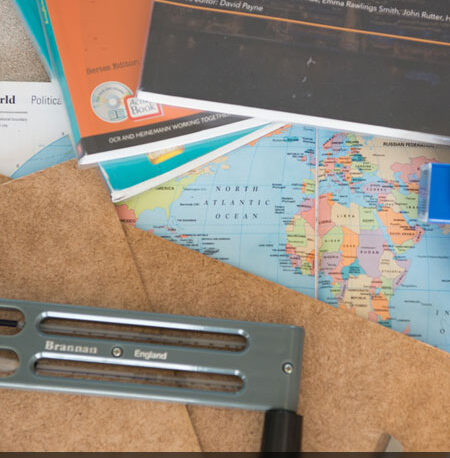Geography
Geography is an extremely topical subject in today’s curriculum. Geography is fundamental to understanding the why, how and when of many issues occurring in the world today – from climate change to natural disasters.
When we look at any issue with the balance and scrutiny that geographical study offers, we move beyond the media hype or political spin. Geography allows us to see the world more clearly.
The Bay House geography department has been awarded the ‘Secondary Geography Quality Gold Mark’, Centre of Excellence accreditation from the Geographical Association.
Key Stage 3
At the beginning of Y7 you will be focusing on the local area and how this is shaped, as well as practising fundamental map skills. We will then move on to the wider world, looking deeper into how human influence can have an impact on the environment through activities such as Tourism. In the spring term, we will continue to focus on the interactions between human and physical geography in our exploration from Pole to Pole. In the summer term we then investigate the processes that occur within rivers and how these can be affected by humans. Pupils will then complete the year in their investigation into industry and the impacts of this in low income countries.
In the Autumn term Y8 pupils begin with Population. This explores themes of development and how this can have an impact on a country’s population, as well as innovative new ideas of sustaining our ever growing global population. They will then go on to explore the causes and effects of Our Wild Weather in the UK, applying this to recent case studies such as Storm Eunice (2022). Pupils are then required to think critically about the opportunities and challenges of megacities across the world and their sustainability. We complete the year with the investigation into Dynamic Coasts and the processes that occur along these, ending with a field trip to Stokes Bay Beach.
Pupils in Y9 start exploring the shaping of our world through concepts such as plate tectonics and Continental Drift Theory, where they are required to evidence their knowledge using theory to suggest reasons for the processes that are occurring. The topic of Development is investigated through evaluating the causes and impacts of uneven development across the world. Climatic hazards are investigated using current case studies, looking deeper into how these will lead to further issues in the future.
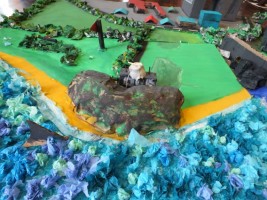
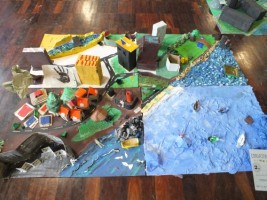
GCSE
Our GCSE Geography course, following the AQA specification, offers students a comprehensive and engaging study of both human and physical environments. The curriculum covers a broad range of topics, including Urban Issues and Challenges, The Changing Economic World, Resource Management, Natural Hazards, The Living World, and Physical Geography of the UK. These topics help students gain a deeper understanding of the complex interactions shaping the world around them.
The course is assessed through three exam papers. Paper 1 focuses on physical geography, covering natural hazards, the living world, and UK physical landscapes. Paper 2 explores human geography, examining urban issues, economic changes, and resource management. Paper 3 is a unique combination of issue evaluation, which requires students to apply their knowledge to contemporary geographical scenarios, and fieldwork-based questions.
Geography is a highly relevant and versatile subject that equips students with skills such as data analysis, critical thinking, and problem-solving, making it valuable for a variety of careers, from urban planning to environmental management. Our students also gain practical experience through fieldwork in locations like Portsmouth and have had the opportunity to participate in international trips to places such as Iceland and Sicily, bringing real-world applications to their studies.
Whether you are passionate about understanding the natural world or eager to explore human impacts on our planet, Geography provides insights that extend far beyond the classroom.
A Level
Our A Level Geography course, following the AQA specification, offers a dynamic and challenging curriculum designed to deepen students’ understanding of the world’s physical and human environments. Throughout the course, students study topics such as The Water and Carbon Cycle, Coasts, Hazards, Changing Places, Global Systems and Governance, and Population and the Environment. This comprehensive coverage ensures that learners develop a well-rounded perspective on both local and global issues, preparing them for further study or careers in geography and related fields.
The course assessment consists of two exam papers- human geography and physical geography, complemented by an independent research project where students design and conduct their own fieldwork investigations. This project fosters independent learning and allows students to explore a geographical question of their choice, collecting and analysing data to produce a detailed report. Previous fieldwork has taken place in diverse locations such as Portsmouth, Christchurch Bay, Swanage, and West Wittering, providing students with firsthand experience in a variety of coastal and urban environments.
Geography is a versatile subject that bridges the sciences and humanities, equipping students with critical thinking, research, and analytical skills. It is highly regarded by universities and employers, opening up a range of pathways in fields such as environmental science, urban planning, conservation, and international development. Our students also have the opportunity to enhance their learning through international trips, with previous destinations including Iceland and Sicily, providing an invaluable opportunity to see geography in action on a global scale.
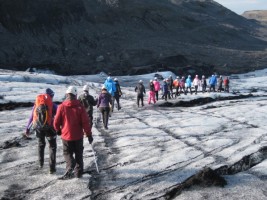
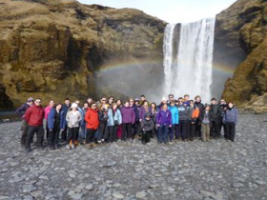

Don’t just take it from us…
“I love geography because the teachers motivate you to do well” (JW, Y11)
“Geography will help me in my future career” (TE, Y11)
“The reason that I like geography is because it’s interesting and fun to learn. I’m also very excited about the potential trips to Iceland and Morocco at A- Level” (AA, Y11)
“I love geography because I get to learn about the planet” (LP, Y8)
“Geography helps me find out how an ever changing world works” (OW, Y11)
“Geography is very fun because we get to do outdoor learning and the home learning is creative” (TS, Y9)
“I love geography!” (AE, Y9)
“I like geography because I get to find out about new things, including how the earth works and how volcanoes lead to the world we see today” (JL, Y9)
“Geography allows me to explore and learn about different cultures” (TC, Y11)
“I like geography because you get to learn about different cultures and how they respond to natural disasters and how this can lead to some beautiful things in reality” (BG, Y9)

